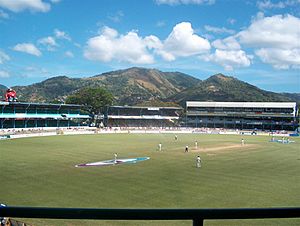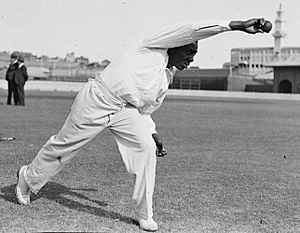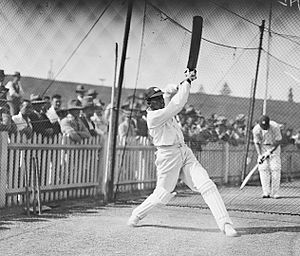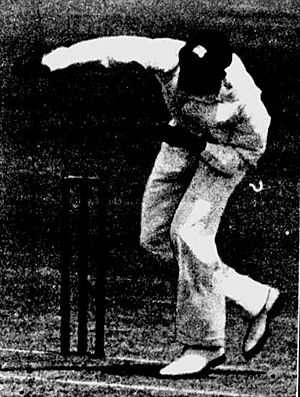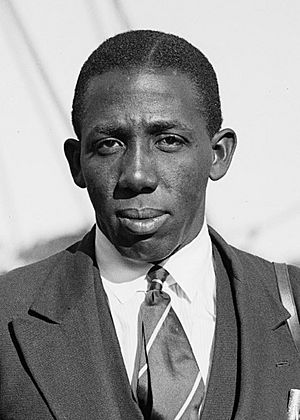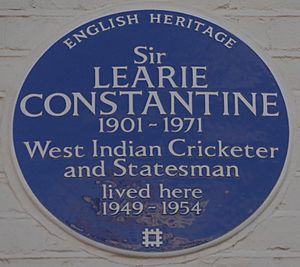Learie Constantine facts for kids
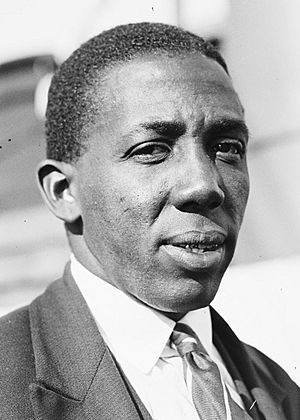
Constantine in Australia in November 1930
|
||||||||||||||||||||||||||||||||||||||||
| Personal information | ||||||||||||||||||||||||||||||||||||||||
|---|---|---|---|---|---|---|---|---|---|---|---|---|---|---|---|---|---|---|---|---|---|---|---|---|---|---|---|---|---|---|---|---|---|---|---|---|---|---|---|---|
| Full name |
Learie Nicholas Constantine
|
|||||||||||||||||||||||||||||||||||||||
| Born | 21 September 1901 Petit Valley, Diego Martin, Trinidad and Tobago |
|||||||||||||||||||||||||||||||||||||||
| Died | 1 July 1971 (aged 69) Brondesbury, Hampstead, London, England |
|||||||||||||||||||||||||||||||||||||||
| Batting | Right-handed | |||||||||||||||||||||||||||||||||||||||
| Bowling | Right-arm fast | |||||||||||||||||||||||||||||||||||||||
| Role | All-rounder | |||||||||||||||||||||||||||||||||||||||
| Relations |
|
|||||||||||||||||||||||||||||||||||||||
| International information | ||||||||||||||||||||||||||||||||||||||||
| National side | ||||||||||||||||||||||||||||||||||||||||
| Test debut (cap 3) | 23 June 1928 v England | |||||||||||||||||||||||||||||||||||||||
| Last Test | 22 August 1939 v England | |||||||||||||||||||||||||||||||||||||||
| Domestic team information | ||||||||||||||||||||||||||||||||||||||||
| Years | Team | |||||||||||||||||||||||||||||||||||||||
| 1921/22–1934/35 | Trinidad and Tobago | |||||||||||||||||||||||||||||||||||||||
| 1938/39 | Barbados | |||||||||||||||||||||||||||||||||||||||
| Career statistics | ||||||||||||||||||||||||||||||||||||||||
|
||||||||||||||||||||||||||||||||||||||||
|
Source: CricketArchive, 23 March 2009
|
||||||||||||||||||||||||||||||||||||||||
Learie Nicholas Constantine, also known as Baron Constantine, was a famous West Indian cricketer, lawyer, and politician. He was born on September 21, 1901, and passed away on July 1, 1971. He played 18 Test matches for the West Indies before World War II. He even took the West Indies' first ever wicket in Test cricket!
Constantine was a strong voice against racial discrimination. Later in his life, he helped pass the 1965 Race Relations Act in Britain. This law made it illegal to discriminate against people because of their race. He was knighted in 1962 and became the UK's first black peer in 1969. This meant he could sit in the House of Lords.
Born in Trinidad and Tobago, Constantine quickly became known as a talented cricketer. He toured England with the West Indies team in 1923 and 1928. He was not happy with the limited chances for black people in Trinidad. So, he decided to become a professional cricketer in England. He played for the Nelson Cricket Club from 1929 to 1938. He continued to play for the West Indies Test team during this time.
During World War II, Constantine worked to help West Indian factory workers in England. In 1943, a London hotel refused to let him and his family stay because they were black. This was an example of the "colour bar" in the UK. Constantine successfully sued the hotel. This case was a big step for racial equality in Britain.
Constantine became a lawyer in 1954. He also worked as a journalist and broadcaster. He returned to Trinidad and Tobago in 1954 and entered politics. He helped start the People's National Movement party. He became a government minister. From 1961 to 1964, he was Trinidad and Tobago's High Commissioner to the UK. He spoke out against racial discrimination, including the Bristol Bus Boycott. In his final years, he served on the Race Relations Board. He died at age 69. In 2021, he was added to the ICC Cricket Hall of Fame.
Contents
Early Life and Cricket Beginnings
Constantine was born in Petit Valley, Trinidad, on September 21, 1901. He was the second child in his family. His father, Lebrun Constantine, was a famous cricketer. He played for Trinidad and Tobago and toured England. Learie's mother, Anaise Pascall, also had a brother, Victor Pascall, who was a cricketer. Learie's brother, Elias Constantine, also played for Trinidad and Tobago later on.
Learie's family was not rich, but he had a happy childhood. He loved playing cricket from a young age. His family often practiced together. His father and uncle helped him learn the game.
Constantine went to St Ann's schools until 1917. He wasn't very interested in schoolwork. But he was great at sports, especially cricket. He captained his school cricket team. He became known as a strong batsman, a good fast bowler, and an excellent fielder. His father didn't let him play competitive club cricket until 1920. He wanted Learie to start a professional career first. After school, Constantine worked as a clerk for a law firm. But it was hard for black Trinidadians to advance in the legal field back then.
Cricket Career Highlights
Playing in Trinidad and Tobago
Constantine joined Shannon Cricket Club in 1920. He quickly moved from the second team to the first team. Cricket in Trinidad and Tobago was often divided by race. Shannon Club was mostly for black players. This club helped shape Constantine's views on fairness. He noticed that white players were often chosen over more skilled black players.
Constantine's cricket skills grew. In 1921, he played his first first-class match for Trinidad and Tobago. He made his debut against Barbados. He didn't score many runs, but he took two wickets. His fielding was also very impressive.
In 1922, he played in another tournament. His fielding was so good that he kept his place in the team. The Barbados captain, Harold Austin, was impressed by Constantine. Austin helped him get selected for the West Indies tour of England in 1923. This was a surprise choice for many. Constantine quit his job to go on the tour.
First Tour of England in 1923
The West Indies team played 21 matches in England in 1923. They won six games. This tour showed English critics that West Indies cricket was getting stronger. This helped the team gain "Test match status" in 1928. Constantine impressed critics with his exciting style of play. He scored 425 runs and took 37 wickets on the tour.
He scored his first half-century against Oxford University. He also took five wickets in an innings for the first time. Wisden Cricketers' Almanack, a famous cricket book, said his batting was unusual but effective. They also noted his fast bowling. Many English players, like Jack Hobbs, saw his talent. Pelham Warner, a former England captain, called him the best fielder in the world.
Becoming a Professional Cricketer
Constantine learned a lot from his first tour of England. He realized cricket could be his path to a better life. When he returned to Trinidad, he struggled to find a good job. His success in England made him want to become a professional cricketer. He practiced hard to improve his game.
In 1928, Constantine went on another tour of England. His main goal was to get a professional cricket contract. He wanted to escape the social limits placed on him in the West Indies. He felt that his status as a cricketer didn't match his status as a black man.
On this tour, Constantine played brilliantly. He scored his first century against Essex. He also had an amazing all-round performance against Middlesex at Lord's. He scored 50 runs in 18 minutes and 86 runs in under an hour. He then took seven wickets. Later, he scored 103 runs in 60 minutes to help his team win. This match was a defining moment in his career. Soon after, the Nelson Cricket Club offered him a professional contract.
Test Cricket Debut and Success
Constantine's 1928 tour was very successful. He was less effective in the three Test matches, which were the first ever played by the West Indies. But he took the West Indies' first Test wicket. He ended the tour with the most runs, wickets, and catches among the West Indian players. His aggressive and entertaining style made a big impression on the crowds. He helped create a unique West Indian style of cricket.
After the 1928 tour, Constantine helped Trinidad and Tobago win a local tournament. He scored 133 runs, his highest score ever. He also took 16 wickets. He couldn't play in this tournament anymore after becoming a professional.
In 1930, Constantine played against England in the West Indies. He scored runs quickly and took wickets. In one match, the West Indies won their first ever Test match. Constantine took four wickets and then five more to secure the victory.
He then joined the first West Indies team to tour Australia in 1930–31. The team was worried about how black players would be treated. But they received a good welcome. Constantine didn't do as well in the Test matches. But he was very popular with the fans in other games. His fielding was praised, and he was called the fastest bowler in Australia. Donald Bradman, a legendary Australian player, later called Constantine the greatest fielder he had ever seen.
Later Test Matches
Constantine played for Nelson and didn't play much first-class cricket for two years. He joined the West Indies tour of England in 1933. He played in the second Test match. During this game, there was a controversy about "Bodyline" bowling. This was a tactic where bowlers aimed at the batsman's body. Constantine and another West Indian bowler were criticized for using it. Constantine believed it was unfair to criticize them when England had used it before.
In the West Indies' second innings, Constantine scored 64 runs quickly. This helped the match end in a draw. He was supposed to play in the third Test, but a deal fell through.
Constantine coached cricket in India in 1934. He then played in the Test series against England in the West Indies in 1935. In one match, he scored 90 runs, his highest Test score. He also took the final English wicket with two balls left in the match. The West Indies won by 217 runs.
In the final Test, Constantine captained the team to victory after the main captain was injured. This was a huge moment, as black men were rarely allowed to captain regional teams. The West Indies won their first Test series ever! The press praised Constantine for his achievements.
Final Tour and League Success
Constantine played his last Test matches in 1939 during a tour of England. He was not happy with the team's strength or the captain. But he still performed well. He bowled at medium pace and used different styles to trick batsmen. He took 103 wickets that season, the most on his team. He also scored 614 runs. Wisden said he brought a "welcome air of gaiety" to Test cricket. He was chosen as one of Wisden's Wisden Cricketers of the Year.
The third Test match in 1939 was his last. The tour ended early because World War II was about to begin. In his Test career, he scored 635 runs and took 58 wickets. He also held 28 catches. He played one more first-class match in 1945. In all first-class cricket, he scored 4,475 runs and took 439 wickets.
Constantine signed a three-year contract with Nelson Cricket Club in 1928. He played for them in the Lancashire League. He earned £500 per season, plus bonuses. He stayed with Nelson until 1937, which was a long time for a professional player. His presence brought many fans to Nelson's matches. Nelson won the league seven times and a cup twice during his time there.
He earned a lot of money, more than most other athletes at the time. This allowed him and his family to live comfortably. He scored 6,363 runs and took 776 wickets for Nelson. He was incredibly successful in league cricket. He once took ten wickets for only ten runs!
Constantine was asked to join Lancashire County Cricket Club. But he preferred league cricket. He found the standard of play in the league very high. He said, "Never in my life have I played harder than in Lancashire."
Life in England and Activism
Life in Nelson
Constantine made a big impact in Nelson. He was seen as a "local champion." He enjoyed the freedom he had in Nelson, which was different from Trinidad. He faced some racism at first, but he quickly set boundaries. He would protest strongly against any outright racism. He later said that his time in Nelson made him a better person.
In 1931, the Constantines moved to a nice area of Nelson. They became friends with people and joined in the town's social life. They visited Trinidad in the winters, but Nelson became their home.
In 1932, C. L. R. James, a West Indian writer, stayed with them. James was involved in a movement for West Indian independence. Through James, Constantine realized he could use his fame to fight for racial equality. He joined the League of Coloured Peoples. This group worked for racial equality for black people in Britain. Constantine also helped James write his first book, Cricket and I, in 1933. This book was an important step for West Indian nationalism.
Wartime Work and Fighting Discrimination
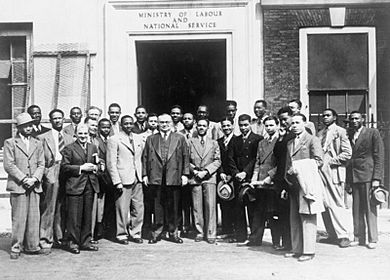
During World War II, Constantine continued to play cricket in charity games. But the war changed his life's focus. He became a Welfare Officer for the Ministry of Labour. He helped many West Indians who came to work in factories in England. He helped them adjust to their new lives and deal with racism. He worked with trade unions to ease tensions between white and black workers. He used his influence to pressure companies that refused to hire West Indians. He preferred to negotiate rather than confront.
Constantine also spoke on BBC radio about West Indians in the war. He became a popular guest on radio shows. He also appeared in a film called West Indies Calling. For his wartime work, he received the MBE award in 1947.
The Imperial Hotel Case
In August 1943, Constantine booked rooms at the Imperial Hotel in London. He was told his race would not be a problem. But when he arrived, he was told he could only stay one night. The hotel said his presence might offend other guests. This was because of the "colour bar," which meant black people were often refused service.
Constantine decided to take legal action. In June 1944, his case, Constantine v Imperial London Hotels, went to the High Court. There was no law against racial discrimination at the time. But Constantine argued the hotel broke its contract with him. The judge ruled in Constantine's favor. He said the hotel had discriminated against him. Constantine won the case, though the damages were small. He felt he had successfully highlighted the issue of racism. This case was a major step for racial equality in Britain. It showed that black people could fight racism in court. It helped pave the way for the 1965 Race Relations Act.
Becoming a Lawyer
Constantine had planned to become a lawyer before the war. He studied hard and worked in a law office. In 1944, he enrolled at the Middle Temple in London. He continued to play cricket and coach to pay for his studies. He also wrote several cricket books. Some of his books, like Cricket in the Sun (1947), talked about the racism he faced.
In 1947, Constantine became chairman of the League of Coloured Peoples. He also got involved in other anti-racism efforts. He found his legal studies difficult, but he was determined to succeed. His wife, Norma, encouraged him to keep going. The family moved to London in 1949. In 1954, Constantine became a qualified lawyer.
Before returning to Trinidad in 1954, he published Colour Bar. This book discussed race relations in Britain and his experiences with racism. It also talked about how to improve the lives of black people worldwide. The book was seen as powerful and challenging.
Return to Trinidad and Political Career
When Constantine returned to Trinidad in 1954, people wanted independence from Britain. He joined the People's National Movement (PNM) party. He became the party chairman in 1956. He believed the PNM's goals matched his own views on improving life for black people.
Constantine ran for election in 1956 and won. He became the Minister of Communications, Works and Utilities. He worked to improve Trinidad and Tobago's roads, railways, water, and electricity. He supported the idea of a West Indies Federation. This was a step towards the islands' independence. His fame in Britain helped with the talks for Trinidad and Tobago's independence in 1962.
In 1961, Constantine decided not to run for re-election. He was then appointed Trinidad and Tobago's first High Commissioner in London.
Later Life and Legacy
High Commissioner in the UK
Constantine started his role as High Commissioner in June 1961. In 1962, he was knighted and became Sir Learie Constantine. He also received the "freedom" of his old town, Nelson. He was seen as a "British treasure."
However, his time as High Commissioner became controversial. He felt he needed to speak out on racial issues affecting all West Indian immigrants. In 1963, a bus company in Bristol refused to hire black staff. Constantine visited Bristol and spoke to the press. His actions helped resolve the issue quickly. This event helped convince the British government that a Race Relations Act was needed. But some politicians felt a diplomat should not get involved in local affairs. Constantine decided not to continue as High Commissioner in 1964.
Final Years and Peerage
Constantine lived in London for the rest of his life. He returned to legal work. He also continued his journalism, writing and broadcasting about cricket, race, and the Commonwealth. He wrote two more books about cricket. He also became a television cricket commentator.
In 1965, Constantine helped create the Sports Council. In 1967, he joined the Race Relations Board. This board investigated cases of racial discrimination. He spoke out against laws that limited immigration. He was also appointed to the BBC's General Advisory Committee and later became a BBC Governor.
In 1969, Constantine was made a life peer. This meant he became Baron Constantine and was the first black man to sit in the House of Lords. He said this honor was for his efforts to help people of different colors live together. He made one speech in the House of Lords due to his poor health.
Constantine died of a heart attack on July 1, 1971. His body was flown to Trinidad and Tobago for a state funeral. He was given Trinidad and Tobago's highest honor, the Trinity Cross. A memorial service was held for him in London at Westminster Abbey.
Trinidad and Tobago's national library keeps a collection of photos, newspaper clippings, and documents about Constantine's life. This collection is recognized by UNESCO as part of the Memory of the World Programme.
Family Life and Personality
Constantine married Norma Agatha Cox in 1927. Their only child, Gloria, was born in 1928. Norma was a great support to him throughout their marriage. She encouraged him to pursue his career goals. Norma passed away two months after Learie in 1971.
People described Constantine as having "easy humor and essential patience." He was a compassionate person who always stood up for what was right. He was known for his warmth and friendliness, as well as his sharp mind. He didn't get along with everyone, though. He had a long-running disagreement with England cricketer Wally Hammond. But they eventually made peace and became friends.
Some people felt Constantine was too focused on race in his early years. But he was an outgoing person with great self-belief. He brought "style and humor" to cricket. He is remembered for his fight for racial tolerance and his efforts to bring people of different backgrounds together.
Images for kids


